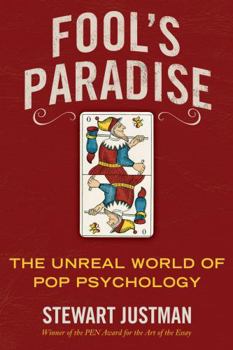Fool's Paradise: The Unreal World of Pop Psychology
Select Format
Select Condition 
Book Overview
Through the channels of the mass media, celebrity psychologists urge us to realize that society has robbed us of our authentic selves. That every moral standard or prohibition imposes on our selfhoods. That what we have inherited from the past is false. That we ourselves are the only truth in a world of lies. That we must challenge "virtually everything." That we must "wipe the slate clean and start over." Each of these "principles" is a commonplace...
Format:Hardcover
Language:English
ISBN:1566636280
ISBN13:9781566636285
Release Date:July 2005
Publisher:Ivan R. Dee Publisher
Length:276 Pages
Weight:1.20 lbs.
Dimensions:1.0" x 6.6" x 9.0"
Customer Reviews
3 ratings
A Much Needed Balance to the World of Self Help
Published by Thriftbooks.com User , 18 years ago
Justman clearly exposes many of the contradictions and outright bouts of logical errors found in self-help tomes. He rightly describes the way self-help authors seek to estalish themselves as your one true friend, while accusing the rest of the world, especially your parents and any traditional insitutions, of conspiring to make you unhappy. Today's self help gurus rant against tradition and the past, while blindly building on the past tradition of the self help movement. I give Justman 4 stars because I think there are some self-help books, authors and techniques that can be useful. Not all of them can be pigeonholed as snake oil. Anyone who reads self-help books should read Fool's Paradise to get a different perspective on the subject. I would also recommned Paul Pearsall's The Last Self-Help Book You'll Ever Need. Pearsall, a practicing psychologist, offers critique's of self-help backed up by studies, while at the same time allowing for self-help to be, well, helpful.
A wonderful book of powerful literary criticism
Published by Thriftbooks.com User , 19 years ago
It is important to understand that this takes on the world of pop psychology as a subject for literary criticism rather than debating its medical claims, a subject for humorous satire, or by offering its own "therapy". Any of the alternatives would be justified and could have been successful, but I really do appreciate the serious way literary criticism is used in these essays because we get so little of it in our post-modern values-neutral deconstructionist non-judgmental age. Here, instead of a bunch of emotional ranting trying to pass as analysis we get an informed and reasoned approach that demonstrates the ways in which the world of pop psychology has inverted and misused literature from the past, contradicts itself, and actually creates a toxic interpersonal environment. Stewart Justman teaches English at the University of Montana. He has written previously on psychology, studied at Columbia, and is an award winning essayist. He begins this book with an extended essay on the ways in which pop psychology is intertwined with the Utopian movement of the sixties. Not that one sprang from the other, but that the culture was ripe for both and the mis-readings of Utopian literature led to ignorant writings advocating unworkable system. He shows us how these advocates misuse even our Declaration of Independence and its right to the pursuit of happiness for a right to happiness! He notes that some claim this movement is rooted in American Individualism, but the author wonders if any individualist would so completely submit to the dictates of a Wayne Dyer, Steve Covey, or a Phil McGraw (among countless others). He goes through a series of seven chapters demonstrating how this literature inverts traditional values and puts its adherents in even greater isolation and dependency. We go through blame, guilt, obligation, patience, choice, morality, and self-transformation. He shows us how serious psychologists such as Maslow and Laing extend us into a narcissistic world where all relationships are about "me" and even children become accoutrements! Where we must realize that all relationships in our life, our family, our religion are all toxic, EXCEPT for our dependency upon our therapist or guru (again, Dyer, Covey, McGraw, and more). I think the strongest chapters are those devoted directly to literary criticism. Literature Rewritten and Constructing Stories are absolutely terrific and powerful. The author demonstrates the way the reader of this literature is manipulated. It demonstrates how the stories the literature uses also fail the requirements of art and why this important to understand. The last chapter on liberal guilt is quite entertaining because the author shows how this is a guilt of discussion not emotion. If you actually feel the guilt you talk about something is then wrong and the emotion must be disposed of. This is a very good book and I strongly recommend it. I hope college students get an opportunity to read it.
Death of a Sacred Cow
Published by Thriftbooks.com User , 19 years ago
Stewart Justman shoots a diseased sacred cow in Fool's Paradise. He systematically, logically, and humorously holds Pop Psychology and its practitioners in front of a spotlight to strip away the nonsense and reveal their pseudo-science for what it is - repetitive, self sustaining, Utopianism for children. The author describes the self-awareness, discover and liberate your inner child movement as narcissism struggling against the evils of morality, responsibility, and duty. It's a great book for those stuck in a destructive loop of, "maybe the next self help book will make me happy."






